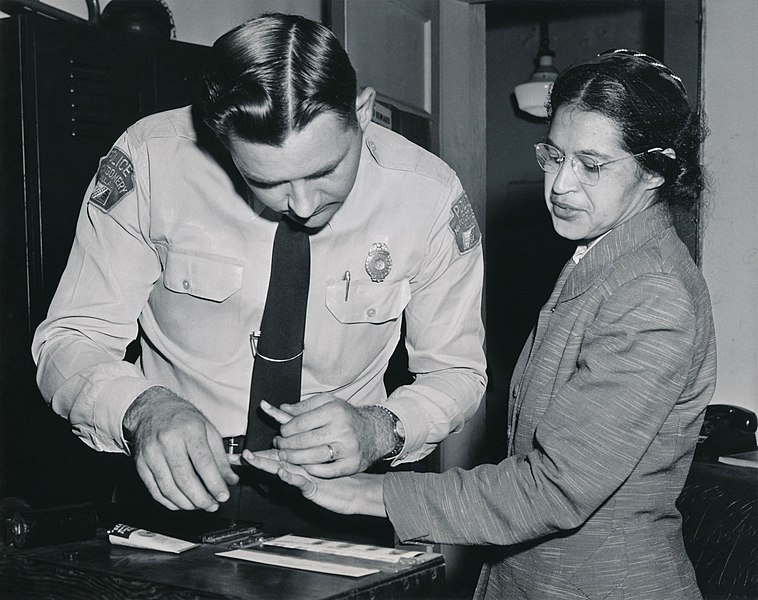Rosa Parks was a prominent figure in the civil rights movement, known for her pivotal role in challenging racial segregation in the United States. Her refusal to give up her bus seat to a white passenger in Montgomery, Alabama, sparked the Montgomery Bus Boycott and became a catalyst for the civil rights movement.
Rosa Parks’ courage and determination made her an iconic symbol of resistance against racial discrimination, inspiring countless individuals to join the fight for equality and justice.
Throughout her life, Parks actively participated in civil rights activism, challenged segregation laws through legal action, and received numerous honors for her contributions.
Her legacy continues to inspire and serve as a reminder of the power of ordinary individuals to effect change and shape history.
Accomplishments of Rosa Parks
1. Sparked the Montgomery Bus Boycott
On December 1, 1955, Rosa Parks, an African American woman, refused to give up her bus seat to a white passenger in Montgomery, Alabama. Her act of defiance ignited the Montgomery Bus Boycott, a nonviolent protest that lasted for 381 days.
The boycott was a collective effort by the African American community, led by figures like Dr. Martin Luther King Jr. and the Montgomery Improvement Association (MIA).
Also Read: Rosa Parks Timeline
The boycott successfully challenged the segregation policy on Montgomery buses, leading to a Supreme Court ruling that declared bus segregation unconstitutional.
This landmark event marked a significant victory for the civil rights movement and set the stage for further activism.

2. Symbolized resistance against racial discrimination
Rosa Parks’ refusal to comply with the racially biased segregation laws of the time made her an iconic symbol of resistance against racial discrimination. Her act was not merely an individual act of defiance but a representation of the larger struggle for equality and justice.
Also Read: Rosa Parks Facts
By sitting down to assert her right to be treated as an equal human being, Rosa Parks became a powerful symbol of the ongoing fight against racial injustice. Her courage inspired countless individuals to question and challenge discriminatory practices and policies.
3. Inspired the civil rights movement
Rosa Parks’ actions had a profound impact on the civil rights movement in the United States. Her refusal to surrender her dignity and rights motivated and energized people across the country to join the fight against racial segregation and discrimination.
The Montgomery Bus Boycott, which was organized in response to her arrest, demonstrated the power of collective action and nonviolent resistance.
Parks’ bravery and unwavering commitment to justice served as a catalyst for subsequent civil rights demonstrations, protests, and campaigns, paving the way for significant legislative changes and societal transformations in the pursuit of racial equality.
Her actions and the movement they sparked left an indelible mark on American history and inspired similar movements for justice and equality around the world.
4. Challenged segregation laws through legal action
Rosa Parks’ refusal to give up her bus seat led to her arrest and subsequent legal challenge to segregation laws in Alabama. The case, known as Browder v. Gayle, was filed by several activists, including Rosa Parks.
The legal team argued that segregated seating on buses violated the Fourteenth Amendment’s guarantee of equal protection under the law. In 1956, the U.S. Supreme Court ruled in favor of the plaintiffs, declaring bus segregation unconstitutional.
This landmark decision not only had immediate effects on bus segregation but also set a precedent for challenging racial segregation in other public spaces.
5. Active member of the NAACP
Rosa Parks had been involved in civil rights activism long before her famous bus protest. She was an active member of the National Association for the Advancement of Colored People (NAACP) and served as the secretary of the Montgomery chapter.
Parks worked alongside other activists within the NAACP to fight against racial injustice, advocate for voting rights, and promote equality through legal means. Her commitment to the NAACP’s mission played a vital role in organizing and supporting various civil rights campaigns and initiatives.
6. Engaged in civil rights activism beyond Montgomery
While Rosa Parks became widely known for her role in the Montgomery Bus Boycott, her activism extended beyond the boundaries of her hometown. She traveled to different parts of the United States, sharing her experiences and speaking at events, rallies, and conferences.
Parks used her platform to advocate for racial equality, social justice, and the end of segregation nationwide. Her presence and impassioned speeches helped inspire and mobilize individuals across the country, amplifying the voices of those fighting for civil rights and bringing attention to the injustices faced by African Americans in various regions.
Parks’ commitment to activism was not limited to her immediate surroundings but encompassed a broader vision for a more equitable society.

7. Received the Congressional Gold Medal
In 1999, Rosa Parks was awarded the Congressional Gold Medal, the highest civilian honor in the United States. This prestigious recognition by the U.S. Congress acknowledged her significant contributions to the nation’s civil rights movement and her role as a symbol of courage and resistance.
The Congressional Gold Medal highlighted Parks’ enduring impact on American history and her dedication to fighting for racial equality.
8. Awarded the Presidential Medal of Freedom
In 1996, President Bill Clinton bestowed upon Rosa Parks the Presidential Medal of Freedom, another highly esteemed civilian honor. This award recognized her extraordinary efforts in advancing civil rights and her lifelong commitment to social justice.
The Presidential Medal of Freedom is a testament to Parks’ remarkable contributions and the lasting legacy she left behind.
9. Commemorated on Rosa Parks Day
Rosa Parks’ legacy and impact are celebrated annually on Rosa Parks Day, observed on February 4th in several U.S. states. This day serves as a tribute to her courage, resilience, and determination in challenging racial segregation and inspiring change.
Rosa Parks Day provides an opportunity to reflect on the progress made in civil rights and to recommit to the ongoing work of combating discrimination and promoting equality.
10. Legacy of inspiring activism
Rosa Parks’ activism and courage continue to resonate and inspire people around the world. Her story serves as a powerful reminder of the potential for ordinary individuals to effect profound change.
Rosa Parks’ unwavering commitment to justice and equality left an indelible mark on history, fueling movements for social justice and inspiring future generations of activists. Her legacy encourages individuals to stand up against injustice, fight for their rights, and work towards a more inclusive and equitable society.
Rosa Parks’ impact extends far beyond her time, and her name remains synonymous with the struggle for civil rights and the pursuit of equality for all.
